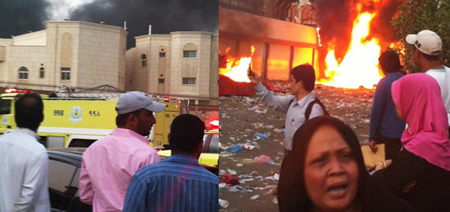 Jeddah, Jun 10: Rioting Indonesian expatriates set fire to a part of their consulate in Jeddah's Rehab district on Sunday in an attempt to force their way in, officials said.
Jeddah, Jun 10: Rioting Indonesian expatriates set fire to a part of their consulate in Jeddah's Rehab district on Sunday in an attempt to force their way in, officials said.
Eyewitnesses said the rioters, who were among thousands of Indonesian expatriates seeking to correct their status as illegal foreign workers, were apparently frustrated by the long wait to get their cases resolved.
Several people were reported injured as the mob set fire to wood, furniture and other combustible material at the entrance of the consulate, sending flames several meters high and dark smoke billowing well into the late evening sky.
As the fire burned, the mob surged close to the consulate walls while several individuals attempted to fan the flames in an effort to burn down the building.
Several injuries were reported, but details were still unavailable.
An Agence France Presse report, quoting an unnamed consulate staff, said one woman died as a result of the fire.
“Some of them lit a fire near the walls of the consulate seeking to enter by force, but leading to the death of a woman,” the source said.
Police confirmed only that a fire had left some people injured, without mentioning any fatality.
Indonesian Ambassador Gatot Abdullah Mansyur told Arab News that all the consulate's staff were safe. “We are still checking if there’s any casualty or how many workers were injured,” he said.
Civil Defense crews, police, special forces and Red Crescent ambulances descended on the scene in an attempt to restore order as men and women chanted angry slogans against consulate officials cowering inside.
Police officers, with arms folded, stood guard outside the consulate entrance. Roads leading to the consulate were sealed off.
At about 9 p.m. the fire was still raging. But firefighters of the Saudi Civil Defense Department later managed to bring the fire under control before it could spread to the consulate building.
The action was “limited to the walls of the compound and did not touch the offices,” said the consular source.
Before the fire, frustrated workers threw stones at the consulate, witnesses said.
The incident followed a stampede on Saturday when Indonesian women stormed the consulate. At least three women were seriously injured and scores received minor bumps and bruises. Several women had fainted.
The Indonesian diplomatic missions in the Kingdom are among those swamped with undocumented nationals trying to meet the July 3 deadline set by the host government for “illegals” to rectify their visa status.
The confrontation between expatriates, police and consulate officials stemmed from Indonesian workers’ frustration over long delays and alleged lack of organization at the consulate.
“We have been having problems with the consulate ever since we arrived two days ago,” said one Indonesian housemaid, who did not want to have her name published. “Yesterday I fell down and got hurt because the consulate didn’t know what they were doing and couldn’t control the crowd.”
Another Indonesian, who said he works in construction, complained that he could never get inside the consulate to legalize his status, while his co-worker wanted to finalize his travel documents.
“Believe me, now I just want to go home,” the construction worker said.
Workers without proper papers are becoming increasingly concerned as violators of the immigration rules in the Kngdom will face penalties when the amnesty period ends on July 3, with punishment including imprisonment up to two years, and fines up to 100,000 riyals ($27,000).
According to official statistics, eight million expatriates work in the kingdom. Economists say there are another two million unregistered foreign workers.
Saudi Arabia is aiming to create job opportunities for its own unemployed by cutting the number of foreign workers, although many of those are in low-paid jobs that Saudis would not accept.
The world’s largest oil exporter is a goldmine for millions of people from poor Asian and Arab countries that are reeling under high levels of unemployment.






Comments
Add new comment